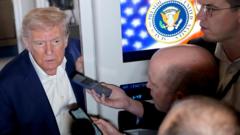US President Trump has made significant moves to exempt key electronic devices from recent tariffs, addressing concerns about rising consumer prices.
Trump Offers Tariff Exemptions for Electronics Amid Trade Tensions

Trump Offers Tariff Exemptions for Electronics Amid Trade Tensions
Exemptions target smartphones and computers, alleviating pressure on US tech firms.
In a notable shift in trade policy, the Trump administration has announced exemptions for smartphones, computers, and various electronic devices from the controversial "reciprocal" tariffs applied to Chinese imports. This decision is seen as a critical relief for the tech industry, particularly with the hefty 125% tariffs imposed on goods from China. The exemption pertains to the general 10% global tariff affecting most nations, primarily aimed at easing financial burdens on companies that rely heavily on Chinese manufacturing.
Speaking from Air Force One during a trip to Miami, Trump signaled forthcoming specifics about the exemptions, noting the substantial revenue being generated through tariffs. "We're taking in a lot of money," he remarked, indicating that the administration is not turning a blind eye to the economic implications of these trade barriers.
The move is significant for US tech giants such as Apple, Nvidia, and Microsoft, whose products are predominantly manufactured in China. According to analysts, this reprieve is a game-changer for investors in the tech sector. Dan Ives, a leading technology researcher, expressed optimism that the exclusion of key products will boost market performance and stabilize pricing for consumers.
These exemptions, which are retroactive to April 5, also encompass critical components like semiconductors and solar cells. The exemptions are part of a broader strategy aimed at encouraging US companies to relocate their production closer to home. White House Press Secretary Karoline Leavitt articulated the administration's stance, reiterating the importance of reducing dependency on Chinese manufacturing for essential technologies.
Despite the positive news for electronics, Trump remains firm on tariffs against China, having escalated them to 145% amid concerns over Chinese retaliatory measures. The economics of iPhones in particular have been under scrutiny, with projections suggesting prices could soar if tariffs were passed onto consumers. Market analysts indicate that a significant chunk of Apple's production is still tied to China, prompting the tech giant to explore other manufacturing locales such as India and Vietnam.
As the debate over trade continues, Trump's administration is treating the tariff regime as a tool not only for economic leverage but also for reshaping global trade dynamics. With the recent exemptions, the focus now shifts to how quickly companies can adapt to ensure competitive pricing while navigating the complexities of international trade relations.


















